The relationship between Pentecostals and the historians Philip Schaff, F. W. Farrar and others along with their influence on the modern definition.
How the traditional definition of tongues all but died and was replaced by the Pentecostal practice of Pentecostal glossolalia — an umbrella term for the language of adoration, singing and writing in tongues, and/or a private act of devotion between a person and God.
Before 1906 there were only two definitions of speaking in tongues within the traditional Christian practice:
- Tongues as the spontaneous ability to speak a foreign language not previously learned or known beforehand
- tongues as someone speaking in one voice and everyone hearing in their own language.
In the 1800’s, this definition expanded:
- Firstly, redefined as glossolalia: an ecstatic state that produces speech-like syllables. A social phenomenon, not a miraculous one
- then modern Pentecostal tongues: a spiritualization of the glossolalia doctrine.
The Azusa Street revival began as a traditional Christian tongues doctrine: many people imbued with the Holy Spirit were perceived with the ability to speak a foreign language spontaneously. The Azusa people and those involved in the greater grassroots holiness movement saw this as a sign to evangelize all the nations. This theology was called Missionary Tongues.
As previously noted in Pentecostal Tongues in Crisis, Pentecostal missionaries arrived at their foreign destinations and discovered they did not have this supernatural linguistic ability.
This problem forced the Pentecostals to either state they were in theological error or redefine speaking in tongues. They chose the latter and modified the definition found in modern commentaries and theologians; mainly those of Philip Schaff, the renowned Anglican writer and speaker Frederick Farrar, the Anglican authors Conybeare and Howson, and a small number of other writers who belonged to the same interpretative framework called Higher Criticism.
Many readers are skeptical of such an assertion. The submission of evidence in the previous portions of this series of articles is weak in connecting the Pentecostal tongues doctrine with that of Higher Criticism. This article will remedy this circumstance with important, substantiated details.
Pentecostal approved historians
Philip Schaff
Philip Schaff (January 1, 1819 – October 20, 1893) was the number one source that the early Pentecostals used to trace their tongues-speaking history. This has already been demonstrated in part 3 of this series where Pentecostals built a historical framework for tongues largely through Schaff’s historical framework. Here are a few more additions to his already revealed relationship.
It is hard to go wrong with such a respected and venerated academic. He is one of the first American-based religious scholars to gain such universal admiration and a literary powerhouse. He produced and oversaw a vast library of publications relating to church history. The level of detail reflecting the history of Christendom is unrivaled even by today’s standards. The attempt by Pentecostals to align his scholarly history with their own experience would be more than enough to establish their newfound identity and acceptance into the religious echelons. They partially succeeded by doing so.
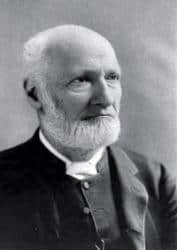
Schaff was a Swiss-born, German-educated professor who studied at three of the most prestigious schools of theology; the universities of Tübingen, then Halle, and finally Berlin. He studied under the greatest German names of theology and philosophy ever produced, especially that of August Neander who is considered the father of the modern glossolalia movement.
His qualities of ecumenism along with his disdain for sects and denominations would have been a welcome theme for Pentecostals. 1
This historian moved to the United States in 1843 and became a professor of Church history and Biblical Literature at the German Reformed Theological Seminary of Mercersburg, Pennsylvania.2 He later taught at the Union Theological Seminary, New York City, and served there until his death.
Although Schaff himself was not a mystic, he had a keen interest in glossolalia, especially in applying it to the Irvingite movement which was one of the most discussed theological issues during his life. He was critical about the Irvingites and concluded it was nothing more than religious excitement—a practice tracing a lineage to the Montanists in the second century.3
Frank Bartleman, one of the integral proponents of the Azusa Street Revival, cited Schaff for affirmation of the tongues displayed in 1906:
We will quote from well known authors some interesting extracts on the subject of “speaking in tongues.” Dr. Philip Schaff, in his “History of the Christian Church,” Vol. I, page 116, says: “The speaking with tongues is an involuntary psalm-like prayer or song, uttered from a spiritual trance, and in a peculiar language inspired by the Holy Ghost. The soul is almost entirely passive, an instrument on which the Holy Ghost plays His heavenly melodies.4
The Assemblies of God publishing arm, Gospel Publishing House, thought so highly of Schaff that they produced a tract from his works and put it up for sale through their flagship newspaper.
The tract, called the Person of Christ, showed how deeply ingrained Schaff had become in the Pentecostal psyche. The actual advertisement is displayed along with a typed facsimile below:
“The Person of Christ” By Philip Schaff. “The one question pushing its way persistently into the hearts and minds of men is ‘What think ye of Christ?’ A clear, concise and convincing answer is given to the world in the pages of this book. No man can afford to miss from his library or his life the ripened fruit of Dr. Schaff’s mind. He has entered the Holy of Holies and brought back to his fellow men a divine message. For the man who desires to know Christ and desires to be more like Him, and desires to lead others to Him, this book is one of God’s choicest gifts.”5
Frederick Farrar
Frederick William Farrar was a gifted Anglican philologist, historian, writer, and speaker. His talents were recognized by Queen Victoria who made him her honorary chaplain.6 He was later called Dean Farrar to reflect his later position as the Dean of Canterbury. His many publications, especially The Life of Christ, was highly successful both in England and the United States. He was a friend of Charles Darwin and a pallbearer at his funeral. Pentecostals embraced two of his writings and oddly ignored one other important one.
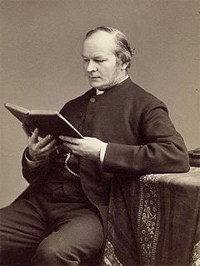
Darkness to Dawn
Farrar rose to prominence in the Pentecostal community when A. A. Boddy published in the May, 1914 edition of Confidence an article called “Glossolalia in the Early Church.”7 which is a book review of Darkness to Dawn by Farrar. As the policy of early Pentecostal periodicals, the name of the actual reviewer is not cited by the publisher.
The reviewer had high respect for the intellectual and historical genius of this high ranking Anglican leader. Although the book was a well-received story about fictional characters in early Rome, the historical framework was considered historically accurate – especially concerning the mode of worship and the rite of speaking in tongues.
The writer believed that Farrar had accidentally paralleled the early Christian history of tongues with the modern-day Pentecostal movement and captured the sense that no other historian had accomplished:
Once more the Dean rightly dwells on the mystic character of “the tongue;” I also (this is worthy of special note) on the mixture of the different languages in “the tongue,” being, as it were, as he says, “the essence and idea of all languages.” Furthermore, how truly does he sum up the impression of the tongues upon the hearts of the hearers as being a blending of ecstatic worship, wonder, thanksgiving, and intercession, often untranslatable, but entering, and possessing with a like burden of worship, and intercession, the spirits of all who are “in the Spirit.”
THE SAME SPIRIT. As we read this marvellously accurate portrayal or the manifestations accompanying the Glossolalia, it is difficult to realise that Dean Farrar had never been present at one of these latter day Pentecostal gatherings (having died several years, at least, before the present Revival of the “Charismata” in the Church), and the extract we have dealt with not only shows how faithfully and successfully he has delineated, from history, the true Scriptural phenomena of the Pentecostal effusion of the Spirit, but the whole passage is, to our minds, a very convincing proof of how, whether we examine the manifestations and operations of the’ Holy Spirit in the Christian assemblies of the days of Nero, or of the Twentieth Century. . .”8
This article started a long-lasting connection between Pentecostals and the late Frederick Farrar. The article itself made its rounds through the Pentecostal community for decades.9 By 1923 the book was converted into a tract. It was advertised and distributed by the Pentecostal Evangel, the official publication of the Assemblies of God. The advertisement in their newspaper reads: “The substance of this tract has been taken from “Darkness and Dawn” by Dean Farrar, and is based on a true account of the manifestations of the Spirit as they were seen in the Church in the days of Nero.”10
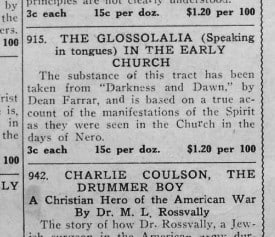
The tract advertisement promoted that the book was a true account. It became a critical reading for all Pentecostals who wanted to know the historical background of speaking in tongues. It was advertised and promoted in every edition of the Christian Evangel for many years.
Comments about his book graced the lips of important Pentecostal leaders. For example, Paul H. Walker, a prominent Church of God (Cleveland) minister included the book as part of his timeline for the history of tongues.11 Ernest S. Williams, Superintendent, Assemblies of God, opined about Farrar’s Darkness to Dawn book in a 1939 edition of the Pentecostal Evangel. He was encouraged by the parallels by Farrar’s view of early Christianity and modern Pentecostalism. He felt the lessons learned from the book can be applied to modern Pentecostal living.12
The Life of St. Paul
Farrar’s important theological work, The Life of St. Paul is omitted from any promotion within the Pentecostal realm. This book had historical significance because it was one of the gateways of German religious thought into the English religious vocabulary. Oxford Encyclopedia co-credited Farrar as the creator of the English word glossolalia.
Farrar promoted that the tongues of Pentecost had nothing to do with a foreign language. “Pentecost, does not contain the remotest hint of foreign languages. Hence the fancy that this was the immediate result of Pentecost is unknown to the first two centuries, and only sprang up when the true tradition obscured.”13 This comment was almost verbatim from the great German scholar that he so greatly admired, August Neander.
Conybeare and Howson
The new concept of tongues as a divine language was also found in Britain where a Pentecostal newspaper, Confidence was published. This paper began in 1908 under the editorship of A. A. Boddy, an Anglican vicar at All Saints in Monkwearmouth, Sunderland, England.
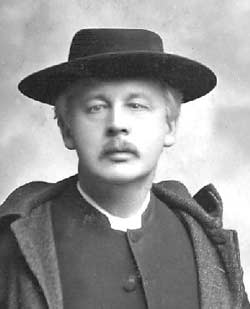
Confidence gave a slightly more critical and intellectual nuance to the movement at a critical juncture in the movement’s infancy.
In the second issue of Confidence, Boddy immediately goes into the intellectual side and quotes from a 1850s publication, the Life and Epistles of St. Paul, by W. J. Conybeare and J. S. Howson. Two Anglican scholars whom Boddy relates; “No writers are more trusted in conservative and orthodox circles than these eminent scholars and Anglican Divines. They wrote about the year 1850, and have both passed away. Dr. Howson became Dean of Chester Cathedral. They would have rejoiced if they had been spared to the days of the Latter Rain, and themselves received the Gift of Tongues, in the Lord’s great goodness.”14
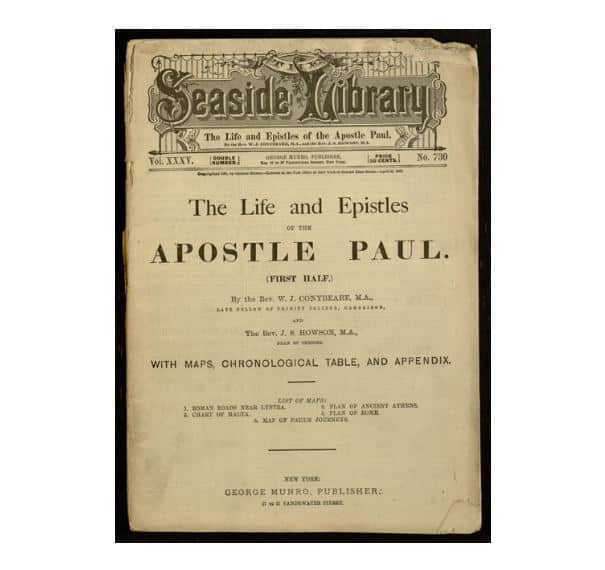
What Boddy didn’t realize was the theological background of these two hallowed authors. These leaders had adopted the German Higher Criticism approach. By doing so, they embraced the relatively new theory about tongues. The main component of this theory concerns the persons under the power of the Spirit were in an ecstasy, pouring forth utterances in communication with God that they could not comprehend. They entirely excluded the traditional interpretation and failed to resolve the tension between their conclusion and the ancient one. Here is a quote directly from their work:
Besides the power of working miracles other supernatural gifts of a less extraordinary character were bestowed upon the early Church. The most important were the gift of tongues and the gift of prophecy. With regard to the former there is so much difficulty, for the notices of it in Scripture, in fully comprehending its nature. But from the passages where it is mentioned we may gather thus much concerning it: first, that it was not a knowledge of foreign languages, as is often supposed; we never read of its being exercised for the conversion of foreign nations, nor (except on the day of Pentecost alone) for that occasion the foreigners present were all Jewish proselytes, and most of them understood the Hellenistic dialect. Secondly we learn that this gift was the result of a sudden influx of supernatural inspiration, which came upon the new believer immediately after his baptism, and recurred afterwards at uncertain intervals. Thirdly, we find that while under its influence the exercise of the understanding was suspended while the spirit was rapt into a state of ecstasy by the immediate communication of the Spirit of God. In this ecstatic trance the believer was constrained by an irresistible power to pour forth his feelings of thanksgiving and rapture in words; yet the words which issued from his mouth were not his own; he was even (usually) ignorant of their meaning. St. Paul desired that those who possessed this gift should not be suffered to exercise it in the congregation, unless someone present possessed another gift (subsidiary to this), called the interpretation of tongues, by which the ecstatic utterance of the former might be rendered available for general edification.15
Boddy and the majority of Pentecostals do not interpret Conybeare and Howson as Higher Criticism scholars. Instead, they saw two respected academics from an established and respected institution whose views align closely with their experience.
The Assemblies of God newspaper which briefly had the name, Weekly Evangel wrote a detailed piece in 1916 called “ Article VII. — The Gift of Tongues, and the Pentecostal Movement.” A writer named B. F. Lawrence concluded the miraculous endowment of tongues as a missionary aid was unfounded. He cited Schaff, Conybeare and Howson as his authority. Speaking in foreign languages can occur, but this is not the main purpose. The intent is to magnify God in whatever way that happens.16.
Encyclopedia Brittanica
This Encyclopedia was cited only on a few rare occasions, and the only one marked for this research was in the Church of God Evangel in 1933.17 This dictionary had little influence.
James Stalker
Frank Bartleman called upon a theologian named James Stalker (1902-1924ish) to support his experience.18 Stalker was a Free Church of Scotland minister and was widely known in the United States where he frequently spoke at seminaries and churches. Stalker didn’t think that the gift of tongues was a rite of speaking a foreign language – it was a tranced utterance and impassioned rhapsody.19 Here is yet another author borrowing from the Higher Criticism cupboard. This author fit in with Bartleman’s belief that the inspiration could express itself in musical forms.
Pulpit Commentary
The Pulpit Commentary was a massive 23 volume work that approached Biblical exposition from many angles. Volumes began appearing in the later 1800s and took over thirty years to complete. There were over 100 contributors to different sections of the Bible who were from clergyman to dissenting ministers.20 The editors were two Anglican-based clerics; Rev. H. D. M. Spence and Rev. Joseph S. Exell.
The Assemblies of God magazine published on two occasions using the Pulpit Commentary as an explanation for speaking in tongues. The first one was in 1916 by John S. Mercer, and the second time in 1927 by Ernest S. Williams. Ernest S. Williams was a general superintendent of the Assemblies of God and also an original participant at the Azusa Street revival.
The Pulpit Commentary was greatly held in esteem that it was republished by the Church of God (Cleveland, Tennessee), a leading Pentecostal denomination.21
The two sections of the Pulpit Commentary cited by Mercer are the Book of Acts by Lord Bishop of Bath and Wells, Rev. Lord A. C. Hervey, and I Corinthians by F. W. Farrar.
Mercer quoted the Lord Bishop of Bath and Wells that tongues were the languages of both men and angels.22 which nicely fit into the mechanics behind the Pentecostal mystical speech. However, this quote does not accurately reflect the Bishop thought. The Bishop thought that there was no doubt that it was a miracle of foreign languages. An alternative could have been a miracle of hearing but found that less convincing. He refuted the idea of tongues being for missionary purposes. He covers the positions of Farrar, Neander and other rationalists, and was not convinced by their arguments. The bulk of his exposition covers their positions. Neither did he believe it was gibberish. He concluded with a philosophical conclusion: tongues signified that all converge into the unity of Christ. The first Pentecost was a symbol that there will come a time that everyone and everything will speak and understand the same speech.23
The Pulpit Commentary on I Corinthians was written by none other than F. W. Farrar himself.
Ernest S. Williams wrote a work in defense against the Pentecostal practice of tongues being one of indecency and frenzy. He aligned his argument with Farrar’s exposition in the Pulpit Commentary where Farrar stated that it was unhistoric and unwarranted “that ‘the gift of tongues’ was a power to speak in foreign languages.”24 After deconstructing the missionary tongues argument, Williams proceeded to affirm his definition of tongues through Farrar who insisted it was similar to the impassioned soliloquies of inarticulate utterance of the Montanists.25
T. B. Barratt’s defense against Higher Criticism literature
T. B. Barratt, a powerful Norwegian preacher and associate of Boddy, was partially responsible for the expansion of Pentecostalism in Europe. He recognized the encroachment of Higher Criticism within the ranks and fought against it.
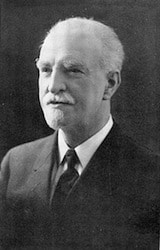
He too provides a historical chart of tongues through the centuries that is very similar to what V. P. Simmons did in 1907 and made a 1600 year jump from Augustine to the Lutheran Reformation, ignoring any Catholic literature.26 He also wanted to emphasize that the gift was not to “usurp the ordinary study of Languages.”27
He does acknowledge that it could be a heavenly or divine language, but he downplays it. He also recognized it can also be a combination of the person’s intellect and divine intervention; “The human mind may use expression stored up by previous experiences, but God brings them out and uses them.”28 He later continues in 1909 to instill the idea of speaking in a foreign language as the most common practice.29
In 1909, Barratt produced the book, In the Last Days of the Latter Rain which may be the most comprehensive coverage on speaking in tongues from a Pentecostal standpoint. In this book, he ardently struggled against Higher Criticism and tried to maintain a traditional progressive stance. The book is a reactionary one based on an article he read on tongues that he disagreed with. Unfortunately, he failed to identify the author, but the citations and structure closely parallel the works of Frederick Farrar. Barratt denounced the Higher Criticism idea that the Pentecost “does not contain the remotest hint of foreign languages,”30 and the real Pentecost was obscure, so a later tradition two-centuries made it out as a miracle of speech. The anonymous writer added that Greek was an international language that the known world shared, and it was unnecessary to speak in foreign languages for the expansion of the Gospel.
He also refuted the idea that the tongues of Corinth were sounds instead of languages,31 and disagreed with Frederick Farrar’s assessment of tongues not being a foreign language.
Five years later a lecture by Barratt in 1914 was put into print: The Gift of Tongues. What is it? Delivered in Möllergaten 38, Kristania (Oslo, Norway), Saturday evening, June 20th, 1914 – a little more than a month before World War I began. It was an oration turned into a small book that “was specifically delivered to answer the criticism’s that had been made by the famed American Bible teacher, Dr. A. C. Dixon who had preached against ‘Pentecost’ the day before at The Tent of Meeting, Kristiania, on Friday 19th June, 1914.”32
The oration shows a shift in the Pentecostal doctrine of tongues and movement towards the words ecstasy and utterance. He once again entertains the idea that it is possible that sometimes it can be a non-human or heavenly language, but emphasizes the miracle of a foreign language by a wide margin. He defends against the idea that Pentecost was a miracle of language and Corinth ecstatic utterances. “The Bible represents the same kind of tongues in both Jerusalem and Corinth. If they spoke in ecstatic exclamations in Corinth, then they did so in Jerusalem also. Possibly they spoke both in language and in ecstasy in both places.”33 He was aware of Neander’s redefining of tongues as an ecstatic rhapsody and rejected it. He had a strong emphasis in the book on the miracle of speaking in foreign languages. However, he does waffle on the subject. He declares that he has seen both. “We have personal experience of both of these forms of speaking in tongues, and have heard them extensively used by the Spirit at our meetings”. He believed that when a person spoke, they did not know what they were speaking. It was an undefined sound. Barratt recognized the conflict in theories, but he fails to resolve this tension.
T. B. Barratt and the Confidence newspaper follow a similar pattern to that of the Apostolic Faith newspaper after 1910. This date was where the activity of speaking in tongues begun to have less coverage. Some references still occurred like the one in a 1913 issue. A woman wrote about speaking in tongues and expressed: “One is lost in God, swept up to heavenly places, and gives utterance in strange sounds, in an unknown tongue, which flow over our lips, now as shouts of joy, then as fervent utterances of love towards our Redeemer, Jesus Christ, and then as petitions.”34 Her experience shows a change in attitude in tongues from a missionary to a personal and private one.
Unfortunately, Barratt’s attempt to reconcile the traditional interpretation with modern practice and his proper critique of historical criticism never took hold in the larger collective mind of the Pentecostal hive. Both Barratt and Boddy became sidelined from the American corpus. The opening of World War I caused many countries to form isolationist thinking and actions limited both Boddy and Barratt in the American affairs of Pentecostalism at a critical juncture of its emerging structure. Barratt was also mired in theological problems inside his Norwegian church and community that were unique to his situation. One must be cognizant of the fact that he was writing in the language of religious scholarship. This would offput the majority of the collective Pentecostal mind who were reactive against such an approach. Neither did Boddy nor Barratt fully endorse the baptism with the Holy Spirit with the initial evidence of speaking in tongues. This too would have been a factor.
In respect to speaking in tongues being foreign languages, he was in the same boat as the editors of the Apostolic Faith Newspaper, Clara Lum and Florence Crawford. They were old guards in an evolving and changing movement.
Conclusion
This completes the four-part series on why the traditional tongues of Pentecost was relegated mostly to the sidelines and replaced by their adaptation of the glossolalia doctrine espoused by Higher Criticism.
The new definitions arose because of the failure of missionary tongues and the media’s backlash of them speaking gibberish. Instead of admitting that their announcement of the miraculous return of speaking in tongues was a mistake, they chose to find a different meaning that explained what was really happening in their midst.
This series clearly shows that Pentecostals looked at specific histories that lined up with their own experience, especially that of Schaff, Farrar, a lesser input from Conybeare and Howson, and a few others. Philip Schaff and F. W. Farrar were so heavily relied upon that it would be fair to say that Pentecostals are followers of these authors tongues framework.
The shift began happening already in 1907 and continued an evolution whereby by 1947 Pentecostals believed solely in tongues as a private means of expression and that missionary tongues was a sad mistake that had been corrected.
This narrative demonstrates how early Pentecostals lacked the fundamental tools of hermeneutics to study the doctrine themselves and the longstanding effects of it. They had to leave it to third-party specialists who were capable of reading, interpreting and translating Greek, Latin, and other texts and weaving a historical narrative. They had no sense that the external authors they depended on were solely from a Higher Criticism framework – who often didn’t even include the traditional interpretation. Even today, Pentecostal scholars have yet to make this connection or reevaluate this doctrine using a critical apparatus.
For more information see the Early Pentecostal Tongues series.
Charles Sullivan has been involved with the charismatic movement since the 1980s and presently attends a charismatic church in Winnipeg called The Church of the Rock.
- For Good or For Ill: Philip Schaff’s Ecumenical Transatlantic Vision of the Church and its Future. Thesis by Greg R. Clarkson. December 3, 2008
- https://en.wikipedia.org/wiki/Philip_Schaff
- “Analogies to this speaking with tongues may be found also in the ecstatic prayers and prophecies of the Montanists in the second century, and the kindred Irvingites in the nineteenth; yet it is hard to tell, whether these are the work of the Holy Ghost, or Satanic imitations, or what is most probable, the result of an unusual excitement of mere nature, under the influence of religion, a more or less morbid enthusiasm, and ecstasis of feeling.” — Philip Schaff. History of the Apostolic Church with a General Introduction to Church History. Trans. By Edward D. Yeomans. New York: Charles Scribner. 1859. Pg. 197
- Bartleman. How Pentecost came to Los Angeles. Self-Published. 1925. Pg. 76; The quote can be found in Philip Schaff. History of the Christian Church, Volume I: Apostolic Christianity. A.D. 1-100. Third Ed. Vol. 1. New York: Charles Scribner and Sons. 1889. Pg. 438
- The Pentecostal Evangel. Aug. 27, 1927 No. 712
- http://www.victorianweb.org/authors/farrar/bio.html
- The Bridegroom’s Messenger claims the article originated from a group in Bournemouth, England
- Confidence. May 1914. Vol. VII. No. 5. Glossolalia in the Early Church. Historical descriptions from the late Dean of Canterbury. Pg. 88-89
- The same article was reprinted three months later in the Christian Evangel; and in 1917 with the Bridegroom’s Messenger; April 1, 1917. Vol 10. No. 198; a breviary can be found in the Latter Rain Evangel in 1925. Latter Rain Evangel. September, 1925. Pg. 22
- Pentecostal Evangel. June 9, 1923. No. 500
- Church of God Evangel. Nov. 18, 1933. Vol. 24. No. 37
- Pentecostal Evangel. May 27, 1939. No. 1307. Pg. 3
- Frederick W. Farrar. The Life and Work of St. Paul. London: Cassell and Company. 1897 (originally published in 1879). Pg. 53ff
- Confidence. May 1908, No. 2. Pg. 4
- W. J. Conybeare, J. S. Howson. The and Epistles of St. Paul. Vol. 1. New Edition. London: Longman, Green, Longman and Roberts. 1961. Pg. 506. This quote is found in Confidence May 1908, No. 2
- Weekly Evangel. June 3, 1916. No. 142. Pg. 4
- “The Baptism with the Holy Ghost and the Evidence” as found in The Church of God Evangel. Nov. 18, 1933. Vol. 24. No. 37.
- Frank Bartleman. How Pentecost came to Los Angeles. Self-Published. 1925. Pg. 77
- Bartleman’s quotation of Stalker is not literal. He has edited the copy from Stalker’s original, though it doesn’t hurt his cause. See The original Life of St. Paul on Pg. 102 and compare it Bartleman’s.
- The Pulpit Commentary. Vol. 13. “The Opinions of the Press” A quote from the Guardian. London: Kegan Paul, Trench & Co. 1884. Pg. 2
- The Church of God Evangel. March 17, 1945. Pg. 2
- The Weekly Evangel. April 22, 1916. Vol. 136. Pg. 6
- Acts of the Apostles by Lord A. C. Hervey. Bishop of Bath and Wells. As found in The Pulpit Commentary. Edited by H. D. M. Spence, Joseph Excell. New York: Funk and Wagnall’s. ND. Pg. 48ff
- Pentecostal Evangel. July 23, 1927. No. 707. Pg. 2. See the Pulpit Commentary Page 456 for more information.
- Pentecostal Evangel. July 23, 1927. No. 707. Pg. 2. See the Pulpit Commentary Page 457 for more information.
- T. B. Barratt. Published Lecture. The Truth about the Pentecostal Revival. 1908. Pg. 21
- T. B. Barratt. Published Lecture. The Truth about the Pentecostal Revival. 1908. Pg. 34
- Confidence. Feb. 19th, 1909, Vol. II. No. 2. Pg. 37
- Confidence. May, 1909. Vol. II. No. 5. Pg. 118
- T. B. Barrett. In the Last Days of the Latter Rain. London: Elim Publishing Company, Ltd. 1928. Pgs. 80-91; He is quoting from Farrar’s “Life and Work of St. Paul. London: Cassel and Company. 1897. Pg. 53.
- T. B. Barrett. In the Last Days of the Latter Rain. London: Elim Publishing Company, Ltd. 1928. Pgs. 80-91
- http://revival-library.org/shop/index.php/e-books/pentecostal-revival/other-pentecostals/product/329-t-b-barratt-the-gift-of-tongues
- T. B. Barratt. The Gift of Tongues. What is it? NP. NL. 1914. Pg. 22
- A Mrs. Polman from Amsterdam explaining her experience. Confidence. Aug. 1913 Vol. VI. No. 8. Pg. 151
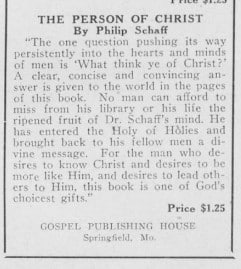
1 thought on “Pentecostals, Tongues, and Higher Criticism”